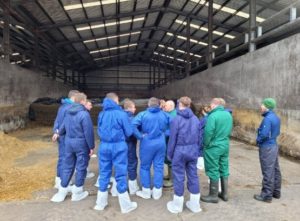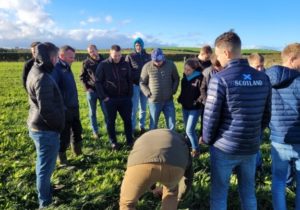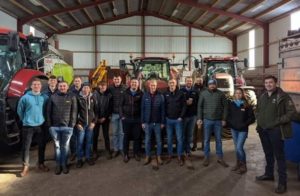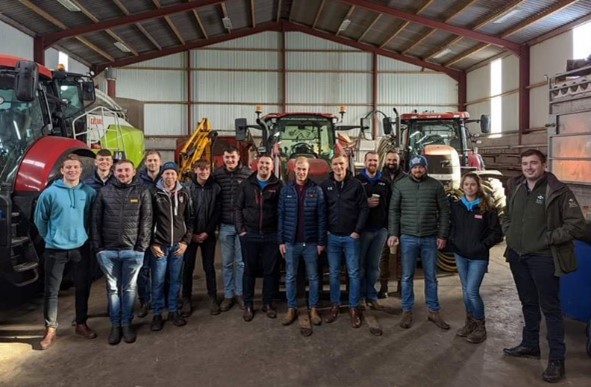FAS Connect Sustainable Dairy Group Trip to Northern Ireland
16 December 2022In October I had the pleasure of taking a group of dairy farmers from FAS Connect’s “Sustainable Dairy Ayrshire” group on a short trip to Northern Ireland to see different dairy farming systems. FAS Connect aims to blend technical information with networking and learning from each other. Working closely with a dedicated group facilitator these small groups are able to tailor content more effectively than larger group meetings.
We started our trip with a tour of Greenmount College, which was fantastic. We learned about the history of the campus and were given an outline of agriculture in Northern Ireland by CAFRE. We were then shown around the dairy unit which has a lot to show as it is a state-of-the-art setup. The highlights for the group members were the interesting technologies utilised to reduce ammonia emissions from the slurry, with the circular stores being covered which can reduce ammonia emissions by up to 60%. In addition to this the cow accommodation had slatted flooring which can achieve a further 40% to 60% reduction in emissions.
Demonstration Farms (TDFs). These farms have been selected to demonstrate innovative technologies/practices. Farmers visiting the TDFs are able to see technologies demonstrated, hear the experience of host farmers and question them about the financial impact of adopting the technologies. There are TDF’s for each sector, each covering different topics such as feed efficiency and genetic selection. TDF’s benefit from a payment of £600 per hosted farm visit.
Our second visit was to Chris Catherwood’s at The Cannons, on the Ards Peninsula. Chris is the farm manager and is in a profit share agreement with the owners of the farm. This in itself was of interest to the farmers, and some discussion was had around the terms of the agreement and the positives and negatives. The highlight of this visit was learning about how species rich herbal leys fit into his system alongside very strict proactive soil and grassland management, with Chris soil sampling every field every year to ensure optimum soil and plant nutrition.
Our final visit was to Redhouse Holsteins, Dungannon. This is a high yielding, high genetic value herd with 170 cows operated by the Irwin family. It was yet another fantastic visit and was the highlight for many of the attendees. The average yield at Redhouse was around 13,500 litres/cow, which is impressive. To achieve this the business has improved all its sheds by placing fans throughout and removing panels in the roof to increase airflow. They have also installed more skylights to increase light levels inside the shed and this was done in conjunction with painting the internals of the shed white every three weeks. This increases light but also acts as a disinfectant, keeping a fresh clean surface on walls etc. The feed shed was another highlight due to its size, which had around 14 bays full of different straights including imported straw from Spain and lucerne from Italy. No expense appears to have been spared which enables their cattle to achieve their genetic potential.
In our spare time during the trip we went on a bus tour of Belfast, which the group found very interesting as well enjoying some good food, drink and live traditional Irish music.
james.orr@sac.co.uk; 01292 525010
Further information
FAS Connect | Helping farmers in Scotland | Farm Advisory Service
How cattle house flooring can reduce ammonia emissions | AHDB
Technology Demonstration Farms (TDF) | Farm Business Support – CAFRE
Sign up to the FAS newsletter
Receive updates on news, events and publications from Scotland’s Farm Advisory Service




